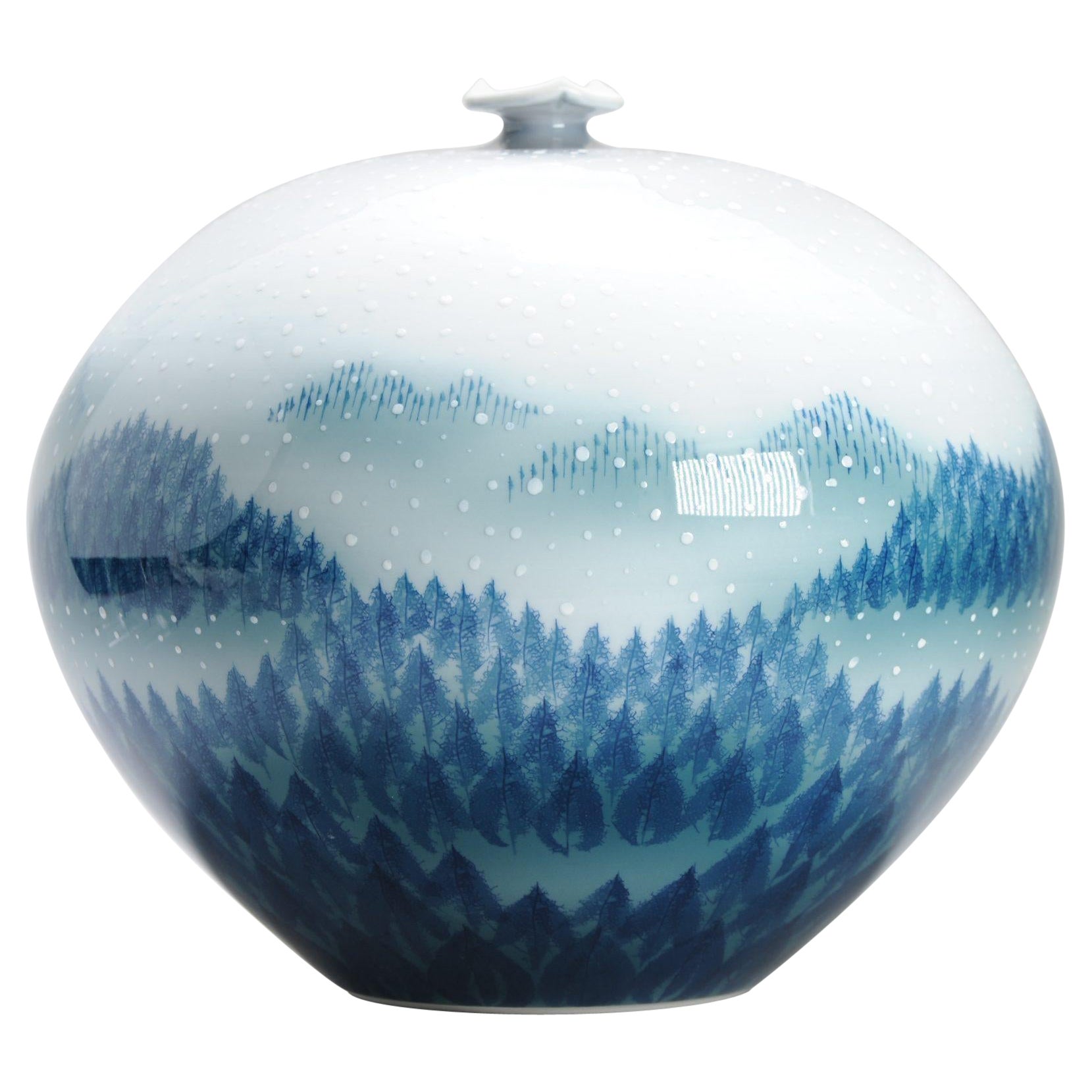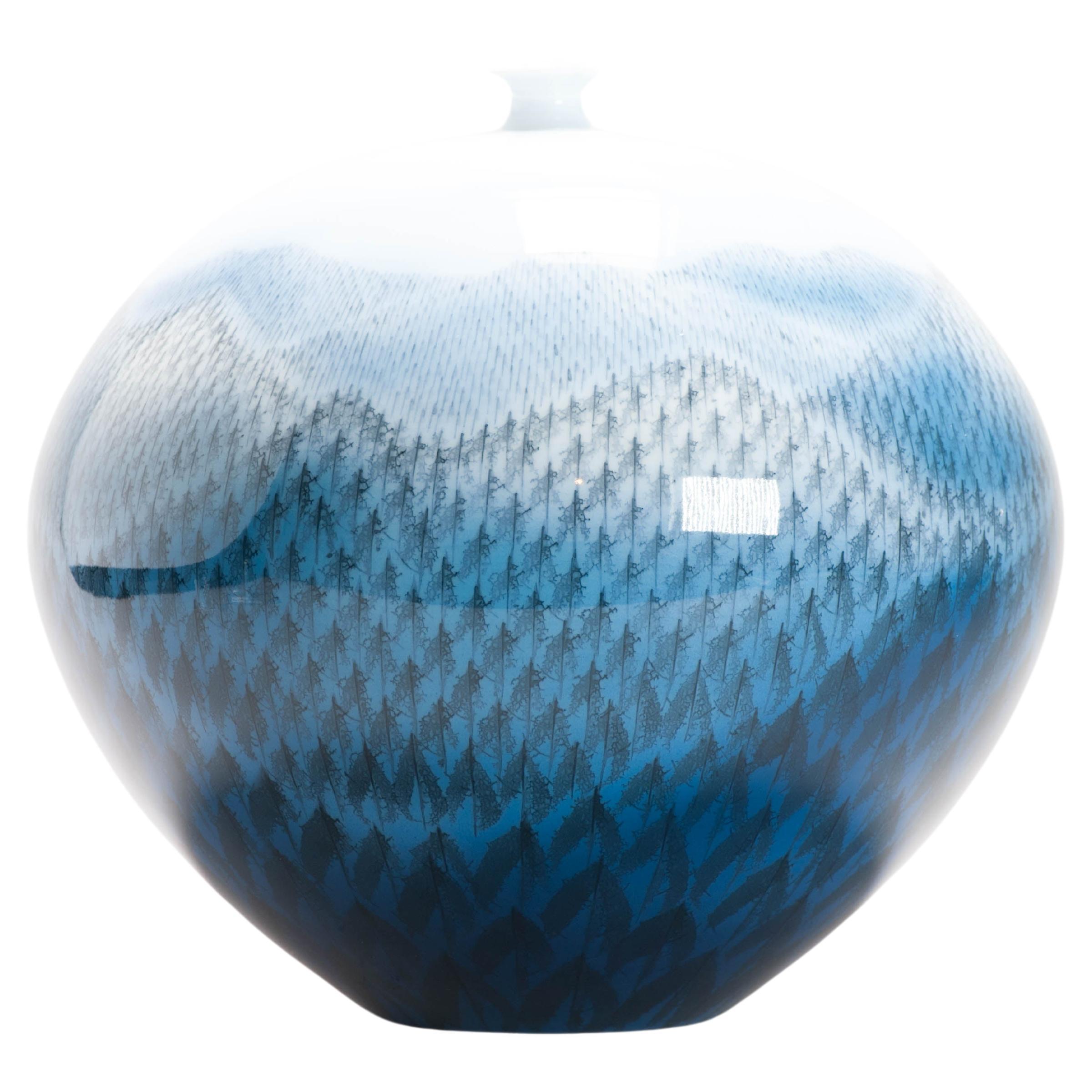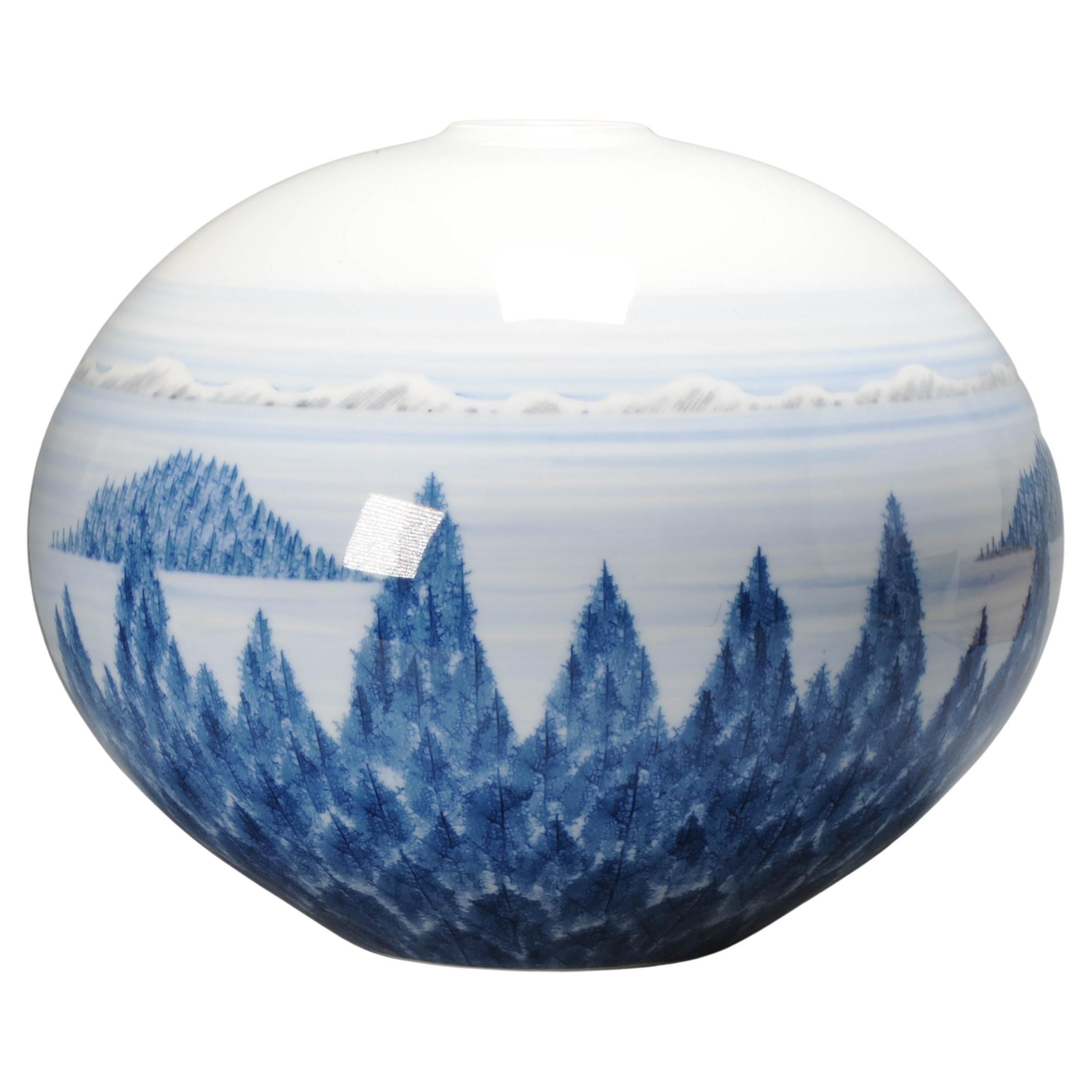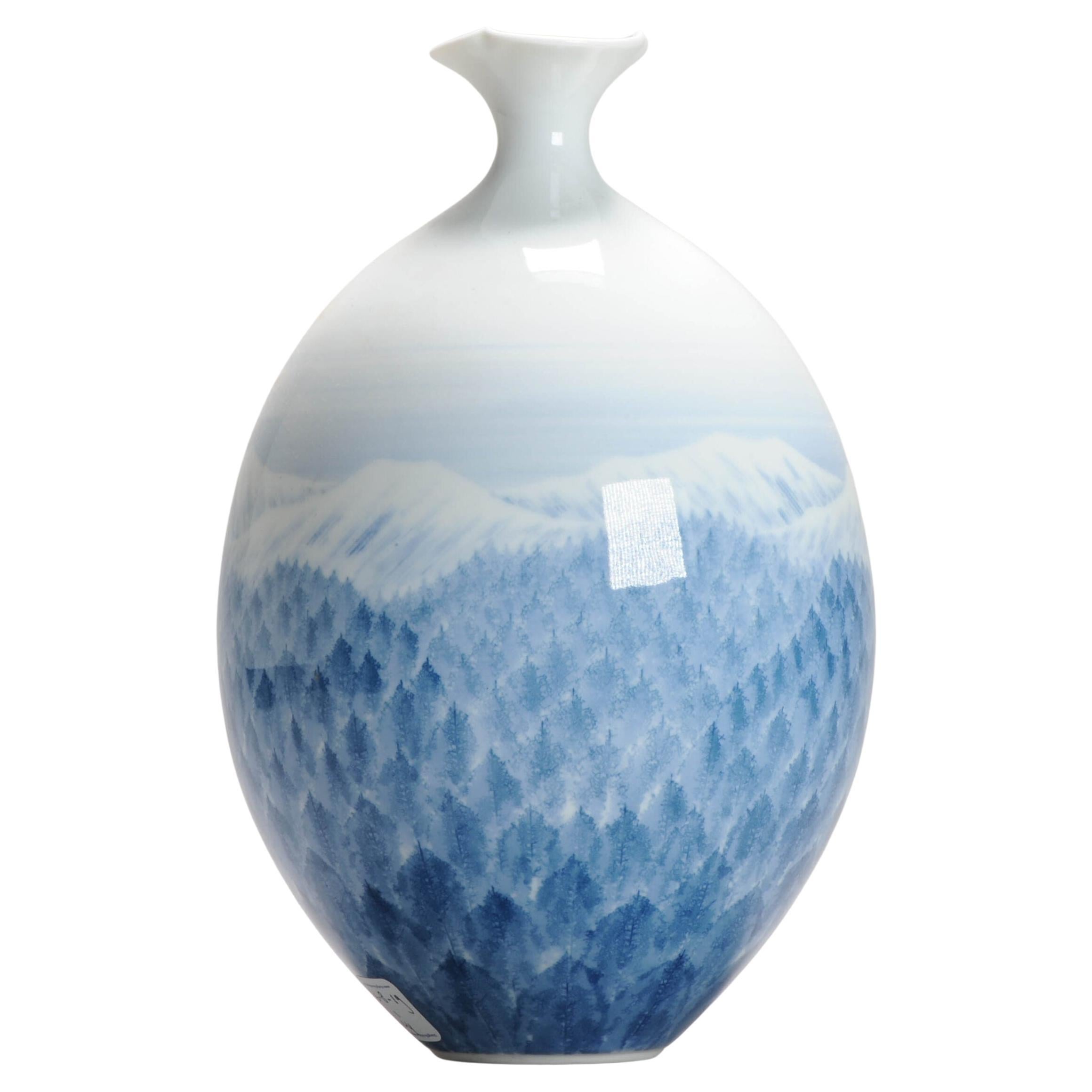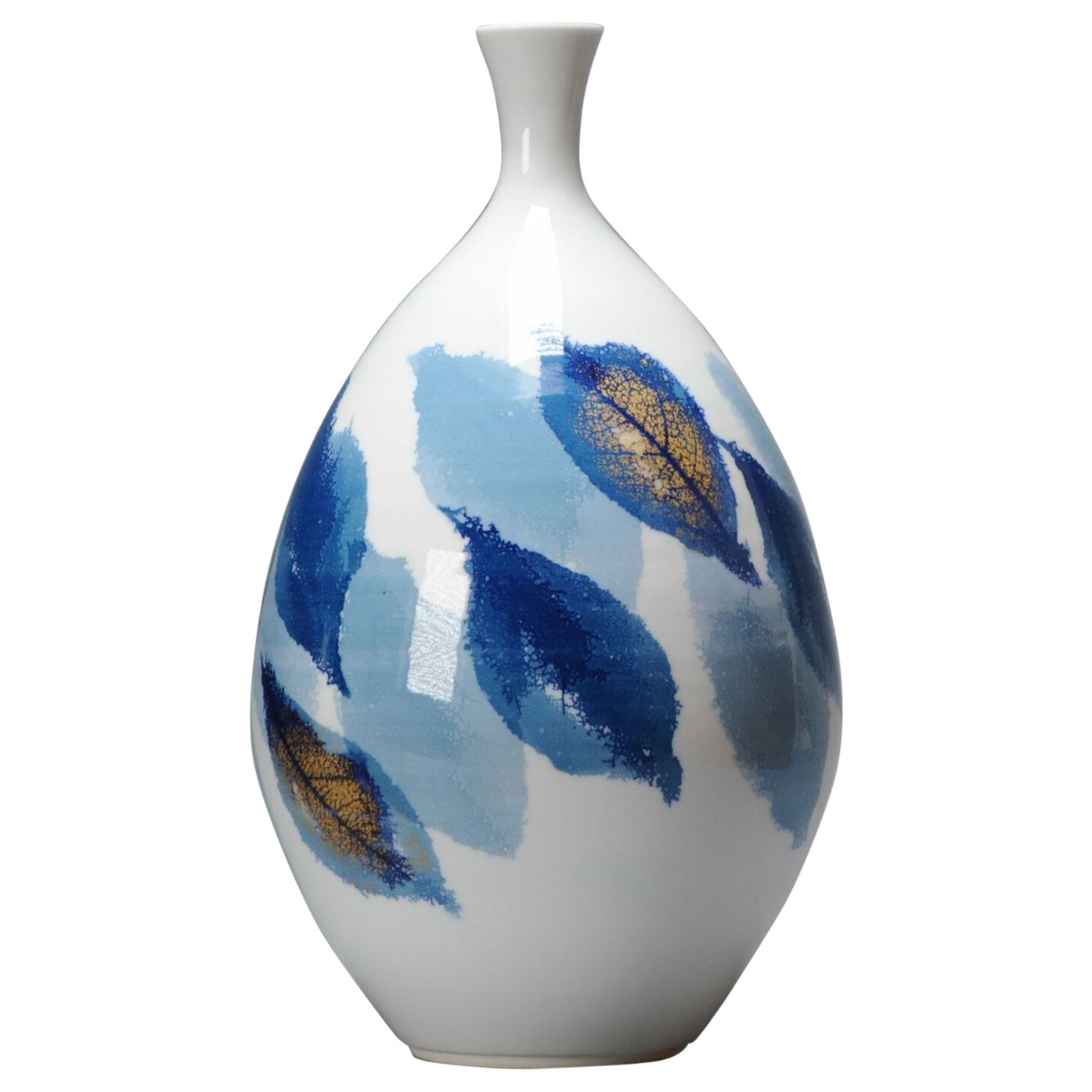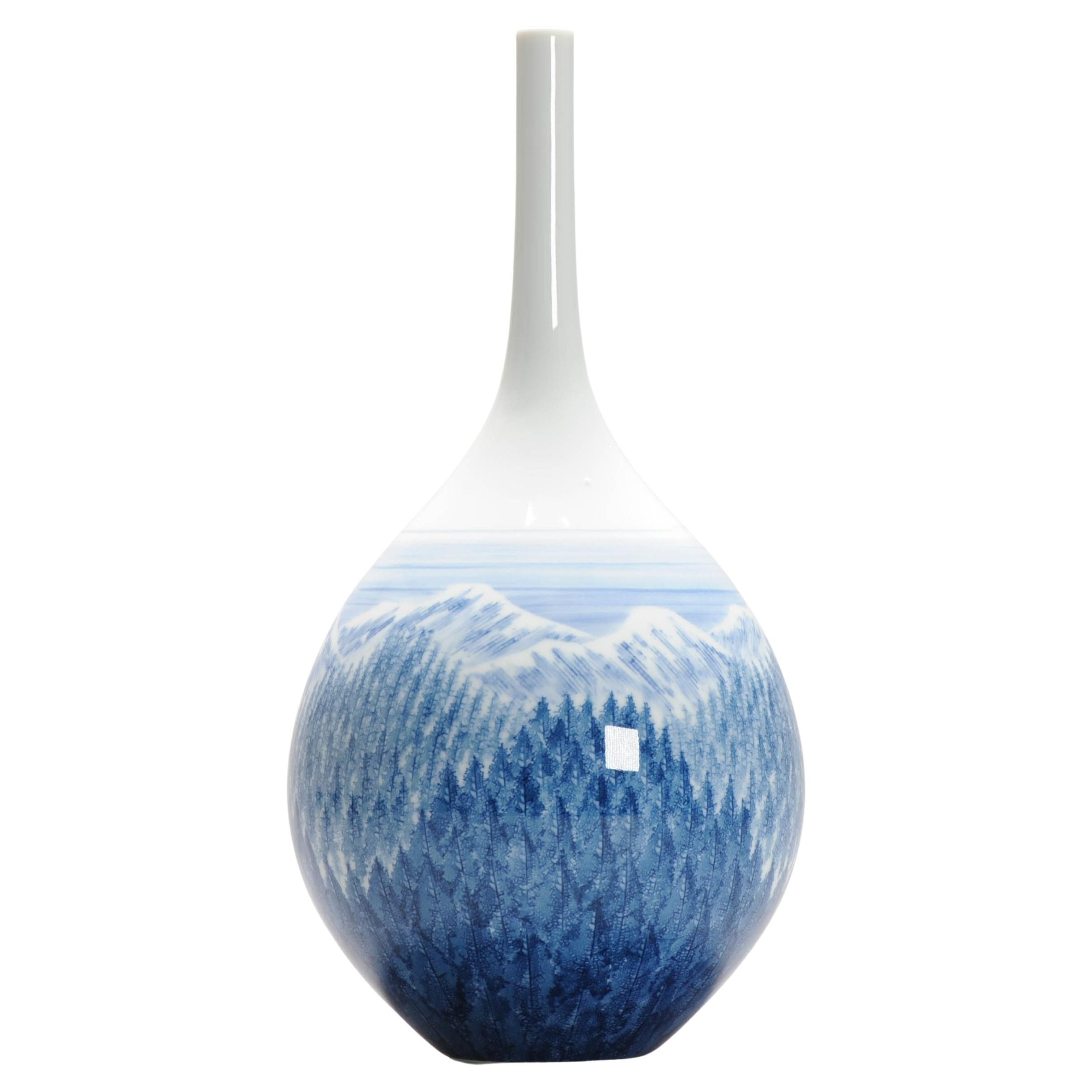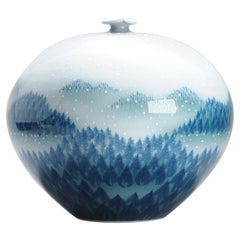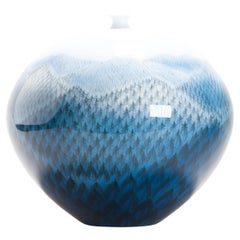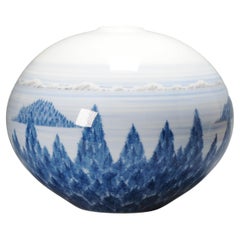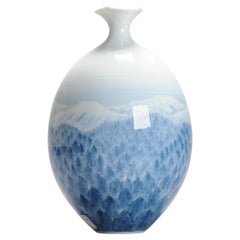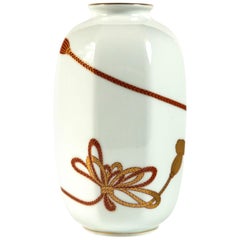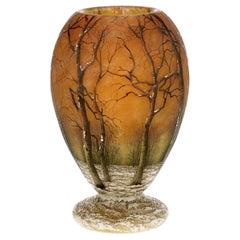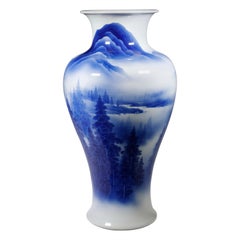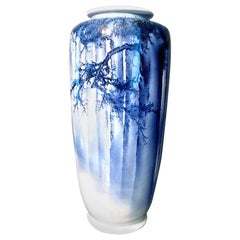Items Similar to Fine Art Japanese Winter Landscape Vase Arita by Artist Fujii Shumei
Want more images or videos?
Request additional images or videos from the seller
1 of 5
Fine Art Japanese Winter Landscape Vase Arita by Artist Fujii Shumei
$4,120.32
$5,150.4020% Off
£2,997.49
£3,746.8620% Off
€3,423.20
€4,27920% Off
CA$5,623.06
CA$7,028.8220% Off
A$6,261.78
A$7,827.2320% Off
CHF 3,258.91
CHF 4,073.6420% Off
MX$77,207.01
MX$96,508.7620% Off
NOK 41,504.73
NOK 51,880.9120% Off
SEK 39,010.42
SEK 48,763.0220% Off
DKK 26,052.15
DKK 32,565.1820% Off
Shipping
Retrieving quote...The 1stDibs Promise:
Authenticity Guarantee,
Money-Back Guarantee,
24-Hour Cancellation
About the Item
Lovely and rare piece.
A superb blue and white porcelain vase, with a winter landscape. Made by Fuji Shumei
Fujii Mr. Aki Fujii's specialty is the technique of drawing a mountain by simulating the veins of a leaf, called the “leaf technique”, as if it were a complex tree branch.
When young leaves such as magnolia are pressed against unglazed pottery like Japanese paper dyeing and bleeding Kuresu, the veins of the leaves emerge as dark lines, and the mountains are drawn by arranging them.
This technique is used to capture the characteristics of the season, and the Arita landscape itself, which I imagined in my mind, is depicted in the work.
Mr. Akiaki Fujii has won many prizes including the Japan Ceramic Art Exhibition and the Kyushu Yamaguchi Ceramics Exhibition Minister of Education Award.
Period 20th century
A pot with dyeing the towering mountains was painted in front of me. If you look closely with your face close, you can see that even the branches of the tree are growing densely. The distant mountains are pale and small. On the other hand, the nearby mountains are drawn thick and large, and I realize that each tree is in the shape of a leaf. Dr. Aki Fujii is synonymous with this "tree leaf technique," which draws a mountain with veins resembling complex tree branches.
When young leaves such as magnolia are pressed against unglazed pottery like Japanese paper dyeing to let gosu bleed, the veins emerge as dark lines, and mountains are formed by lining them up. Mr. Fujii explains, "The mountain is the best way to make the best use of the shape of the leaves. What I draw is the Arita landscape itself that I imagined in my mind." The origin of this style was the leaf of a single tree, which was found only during the walk.
Mr. Fujii, who is also familiar with the bones, said, "In the Meiji era, roasted plates made of wax were made, but these are so-called handmade products. Spare no effort It is said that it takes one to two days to draw a mountain on one vessel.
The Fujii family is a family lineage that has been involved in pottery for generations, such as being allowed to use the family name sword as a pottery kiln during the Edo period. Mr. Fujii's pottery career begins with a 15-year-old painting apprentice. In his twenties, while working for a local ceramics manufacturer, he challenged to exhibit at Nikko. He became independent as a painting craftsman the year after he won the first prize, and opened the kiln 10 years later.
During this time, he has been working on various techniques, including the "cotton thread technique," which involves spraying soil that has been melted with water onto unglazed wrapping yarn to remove the thread and create a three-dimensional effect. At the time of the boom in Komari, there were times when products that could sell were made more and more, which strengthened the idea that “business and art are different things”. I still have the anxiety that "good-looking products sell well, and really good works don't sell well. That's a pain."
After receiving the Prefecture Art and Cultural Achievement Award six years ago, Mr. Fujii has refrained from exhibiting activities such as exhibitions and solo exhibitions at pottery exhibitions for health reasons. On behalf of them, the eldest son, Tsuyoshi (31), is developing an active creative activity using blue-white porcelain. He looks to his successor, who pursues his way with a style different from his father's.
Mr. Fujii himself said, "I think I can make another expression with Konoha technique. I want to open a hole in Arita who is somehow stuck", and he is eager to go outside again.
Additional information:
Material: Bronze & Cloisonne
Japanese Style: Arita
Region of Origin: Japan
Original/Reproduction: Original
Period: 19th century, 20th century PRoC (1949 - now)Showa Periode (1926-1989)
Condition: Overall condition 1 minor hairline to rim with some discoloring.
Dimension: Ø 34 x 31.5 H cm
- Creator:Fujii Shumei (Artist)
- Dimensions:Height: 12.41 in (31.5 cm)Diameter: 13.39 in (34 cm)
- Materials and Techniques:
- Place of Origin:
- Period:
- Date of Manufacture:20th Century
- Condition:Wear consistent with age and use. 1 minor hairline to rim with some discoloring.
- Seller Location:Amsterdam, NL
- Reference Number:Seller: 1449345089271stDibs: LU4863235760482
About the Seller
5.0
Platinum Seller
Premium sellers with a 4.7+ rating and 24-hour response times
Established in 2015
1stDibs seller since 2019
253 sales on 1stDibs
Typical response time: 1 hour
- ShippingRetrieving quote...Shipping from: Amsterdam, Netherlands
- Return Policy
Authenticity Guarantee
In the unlikely event there’s an issue with an item’s authenticity, contact us within 1 year for a full refund. DetailsMoney-Back Guarantee
If your item is not as described, is damaged in transit, or does not arrive, contact us within 7 days for a full refund. Details24-Hour Cancellation
You have a 24-hour grace period in which to reconsider your purchase, with no questions asked.Vetted Professional Sellers
Our world-class sellers must adhere to strict standards for service and quality, maintaining the integrity of our listings.Price-Match Guarantee
If you find that a seller listed the same item for a lower price elsewhere, we’ll match it.Trusted Global Delivery
Our best-in-class carrier network provides specialized shipping options worldwide, including custom delivery.More From This Seller
View AllFine Art Japanese Vase Winter Landscape Arita by Artist Fujii Shumei
By Fujii Shumei
Located in Amsterdam, Noord Holland
Lovely and unusual piece.
A superb blue and white porcelain vase, with a landscape. Made by Fuji Shumei
Fujii Mr. Aki Fujii’s specialty is the technique of drawing a mountain by si...
Category
20th Century Japanese Showa Vases
Materials
Porcelain
Fine Art Japanese Winter Landscape Vase Arita by Artist Fujii Shumei
By Fujii Shumei
Located in Amsterdam, Noord Holland
Lovely and rare piece.
A superb blue and white porcelain vase, with a winter landscape. Made by Fuji Shumei
Fujii Mr. Aki Fujii's specialty is the technique of drawing a mountain b...
Category
20th Century Japanese Vases
Materials
Bronze
$3,157 Sale Price
20% Off
Fine Art Japanese Vase Arita. Artist Fujii Shumei Winter Landscape Born, 1936
Located in Amsterdam, Noord Holland
Lovely and rare piece with matching storage box.
A superb blue and white porcelain vase, with a landscape. Made by Fuji Shumei
Fujii Mr. Aki Fujii's specialty is the technique ...
Category
20th Century Japanese Qing Ceramics
Materials
Porcelain
$2,503 Sale Price
20% Off
Fine Art Japanese Vase Arita. Artist Fujii Shumei Winter Landscape, 20th Century
By Fujii Shumei
Located in Amsterdam, Noord Holland
Lovely and unusual piece.
A superb blue and white porcelain vase, with a landscape. Made by Fuji Shumei
Fujii Mr. Aki Fujii’s specialty is the technique of drawing a mountain by si...
Category
20th Century Japanese Showa Vases
Materials
Porcelain
Fine Art Japanese Vase Arita by Fujii Shumei Winter Landscape, 20th Century
By Fujii Shumei
Located in Amsterdam, Noord Holland
Lovely and rare piece with matching storage box.
A superb blue and white porcelain vase. It has a leaf pattern on both front and back. Signed Shumei to base.
Fujii Mr. Aki Fujii's ...
Category
20th Century Japanese Decorative Bowls
Materials
Bronze
$2,203 Sale Price
20% Off
Art Japanese Vase Arita by Fujii Shumei, Winter Landscape, 20th Century
By Fujii Shumei
Located in Amsterdam, Noord Holland
Lovely and unusual piece.
A superb blue and white porcelain vase, with a landscape. Made by Fuji Shumei
Fujii Mr. Aki Fujii’s specialty is the technique of drawing a mountain by si...
Category
20th Century Japanese Showa Vases
Materials
Porcelain
You May Also Like
Aritaware Porcelain Vase, Fukagawa, Japan, 20th Century
By Fukagawa
Located in Chappaqua, NY
Aritaware porcelain vase, Fukagawa, Japan, 20th century. Octagonal shaped vase. Graphic wrapped tassel design in gold and deep red on white ground.
Category
Late 20th Century Japanese Japonisme Porcelain
Materials
Porcelain
Daum Nancy Winter Landscape Vase
By Daum
Located in New Orleans, LA
Winter Landscape Vase
Daum Nancy
Circa 1920
This exquisite cameo vase by Daum Nancy, known as “Paysage d’Hiver” or "Winter Landscape," masterfully captures the serene beauty of wint...
Category
20th Century French Art Deco Vases
Materials
Art Glass
Rare and Large Japanese Porcelain Vase Makuzu Kozan
By Makuzu Kozan
Located in Atlanta, GA
A striking blue and white vase from the studio of Japanese Potter Makuzu Kozan, also known as Miyagawa Kozan (1842–1916), one of the most established and collected ceramist from Meiji Period. Born as Miyagawa Toranosuke, Kozan established his pottery studio in Yokohama around 1870s and later became one of the appointed artist to the Japanese Imperial household. His work was exhibited in many international fairs that the Meiji government participated at the turn of the century and won many grand prizes.
With an impressively large size, this vase was likely made and reserved as a presentation piece for one of the many expositions the studio participated in the early 20th century. It was decorated with underglaze cobalt blue using the novel technique developed by Kozan called Fuki-e (the blow painting), in order to achieve the striking dimensional literary landscape known as "Mountain and Water". Being one of the most creative ceramists, Kozan started experimenting with new chemical colors from the West in the format of his porcelain glaze around 1880s. New colors allowed him to create underglaze designs that appeared bright, smooth and glossy. He even invented his own receipt of cobalt blue to achieve a much brighter yet softer shade, as evident on this vase. To create landscape that is realistic and dimensional, more common in the western paintings, he was inspired by the native Japanese ink painting technique developed around 1900 by Yokoyama Taikan...
Category
Early 20th Century Japanese Japonisme Ceramics
Materials
Porcelain
Large Japanese Blue and White Vase by Mazuku Kozan Meiji Period
By Makuzu Kozan
Located in Atlanta, GA
A striking blue and white vase from the studio of Japanese Potter Makuzu Kozan, also known as Miyagawa Kozan (1842–1916), one of the most established and collected ceramist from Meiji Period. Born as Miyagawa Toranosuke, Kozan established his pottery studio in Yokohama around 1870s and later became one of the appointed artist to the Japanese Imperial household. His work was exhibited in many international fairs that the Meiji government participated at the turn of the century and won many grand prizes.
With a relative large size, this vase is decorated with underglaze cobalt blue using the novel technique developed by Kozan called Fuki-e (the blow painting), in order to achieve the striking dimensional misty winter landscape. The pine trees with upright trunks and down-sweeping branches appear receding into the depth of the mist, forming an visually unending forest. Known as one of the most creative ceramists, around 1880s, Kozan started experimenting with new chemical colors from the West in the format of his porcelain glaze. New colors allowed him to create underglaze design that appeared bright, smooth and glossy. He even invented his own receipt of cobalt blue to achieve a much brighter yet softer shade, as evident on this vase. To create landscape that is realistic and dimensional, more common in the western paintings, he was inspired by the native Japanese ink painting technique developed around 1900 by Yokoyama...
Category
Early 20th Century Japanese Japonisme Ceramics
Materials
Porcelain
Blue Abstract Painted Vase by Scarlet Pottery
Located in Sammu-shi, Chiba
This is a vase made by the Japanese ceramic artist unit "Scarlet Pottery."
It is a piece of pottery made using Amakusa pottery stone.
Amakusa pottery stone is famous as the raw mater...
Category
2010s Japanese Japonisme Ceramics
Materials
Porcelain
Japan, Large Blue and White exhibition vase by Fuji Shumei
Located in PARIS, FR
This blue and white porcelain vase is a representative work by Fujii Shumei. Born in Arita in 1945, Fujii began his career as an apprentice in a pottery workshop at the age of 15. In...
Category
Late 20th Century Vases
Materials
Porcelain
More Ways To Browse
Japanese Porcelain Pot
Ceramic Face Plate
Magnolia Ceramics
Old Japanese Pots
Mies Mr10
Vintage Face Pot
Japanese Edo Pot
Japanese Bronze Pot
Magnolia Plate
Antique Knife Boxes
Antique Rococo Gilt Wood Frame
Antique Side Table Oval
Antique Wood Drop Leaf Table
Art Deco Black Tray
Art Deco Wooden Lamps
Bamboo Dining Table Glass Top
Bar Stools Set Of Three
Biedermeier Mirror
